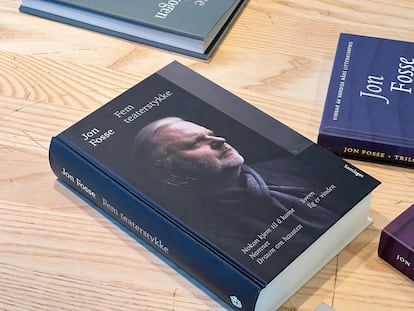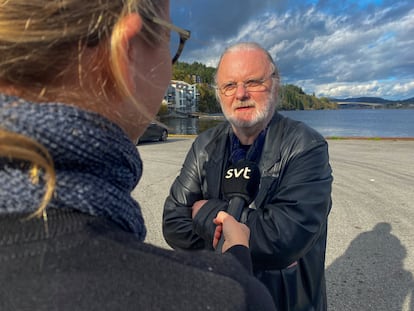Jon Fosse’s plays: between prayers and whispers
At the core of the author’s theatrical works are waiting, loneliness and a sense of emptiness immediately recognizable to any European urban man

Will the Nobel Prize for Literature help to open the door of Spain’s public theaters to Jon Fosse? When he wrote his first play, Someone Will Come, the Norwegian author was 33 and had an established career as a novelist and poet. The theater was not among his priorities, but Kai Johnsen invited him to write a script for the Bergen National Stage, which he himself produced in 1994: Fosse confesses that he accepted the commission because it was “very well paid.” In the following years until 2007, he wrote 25 plays, which made him the most performed Norwegian playwright outside of Norway.
Claude Régy gave Fosse his first international exposure, staging Someone Will Come at the Centre Dramatique National de Nanterre, in the Parisian banlieu. The following year, the Berlin Schaubühne staged The Name at the Salzburg Festival and, a year later, the then young Catalan director Carlota Subirós staged I mai no ens separarem (And We Will Never Part) at the Malic, an indie Barcelona theater that has sadly disappeared. This last production showed with absolute simplicity a woman, subtly embodied by Marta Calvó, waiting and the misunderstanding between another woman and the man the first woman is waiting for. During the performance, which was realistic yet imbued with a fateful strangeness, the sounds coming from the actual scene were at times mixed with other noises filtering in from outside, such as the wailing of an ambulance as it passed along Fusina Street, where the shady, 60-seat theater was located.
That first ephemeral staging of Jon Fosse’s work in Spain was a precursor to an elusive, intermittent, and precarious relationship. In 2002, Antonio Simón directed Someone Will Come at the Beckett theater in Barcelona, where Fosse’s work was put on again in 2011, namely, the first production of I Am the Wind directed in English by Patrice Chéreau. I Am the Wind told the tale of two comrades embarking on a voyage across the immensity of the ocean. It is a symbolic, dialectical voyage, where past and future intertwine with the uncertain pulse, the poetic breath, and the unease typical of Fosse’s dramas. For Fosse, the plot is always a pretext. He claims to write with the same attitude with which he used to play the guitar or the violin as a young boy. The music of the words, the strength of the silences and the weight of the pauses are more important to him than the actual plot or characterization. His is a portrait of waiting, of the anguish that leads to resolving the clash between reality and desire.
A decade after the staging of Chéreau, Marc Chornet dared to stage I Am the Wind at the Frégoli hall of Barcelona’s La Seca Espai Brossa, with Hans Richter and the veteran Manel Barceló, renowned for his fondness of the unusual. Throughout, the voyage, the interactions between the protagonists, The One and The Other, is reminiscent of the interactions between the protagonists of Samuel Beckett’s Waiting for Godot. Fosse has also been compared to Kafka, even though his writing has the musicality of Austrian novel and playwright, Thomas Bernhard.

In the interim between the French-British and Catalan productions of I Am the Wind, Ester Roma put on Winter in Barcelona, a city more open to European avant-garde theater than Madrid. In the first half of the play, a married man on a business trip meets a woman and suggests taking her to his hotel. In the second half, due to thwarted communication, the man waits in vain for the absent woman. Winter was performed at the Versus Glòries and La Seca Espai Brossa theaters, where off-beat authors are welcome. In 2014, Salva Bolta directed a dramatized reading of I Am the Wind at the Teatro Español.
At the core of these plays, and others also written for just two or three actors, is the waiting, the loneliness, and a sense of emptiness, specific perhaps to a time and climate, and immediately recognizable to any European urban man.
Sign up for our weekly newsletter to get more English-language news coverage from EL PAÍS USA Edition
Tu suscripción se está usando en otro dispositivo
¿Quieres añadir otro usuario a tu suscripción?
Si continúas leyendo en este dispositivo, no se podrá leer en el otro.
FlechaTu suscripción se está usando en otro dispositivo y solo puedes acceder a EL PAÍS desde un dispositivo a la vez.
Si quieres compartir tu cuenta, cambia tu suscripción a la modalidad Premium, así podrás añadir otro usuario. Cada uno accederá con su propia cuenta de email, lo que os permitirá personalizar vuestra experiencia en EL PAÍS.
¿Tienes una suscripción de empresa? Accede aquí para contratar más cuentas.
En el caso de no saber quién está usando tu cuenta, te recomendamos cambiar tu contraseña aquí.
Si decides continuar compartiendo tu cuenta, este mensaje se mostrará en tu dispositivo y en el de la otra persona que está usando tu cuenta de forma indefinida, afectando a tu experiencia de lectura. Puedes consultar aquí los términos y condiciones de la suscripción digital.









































